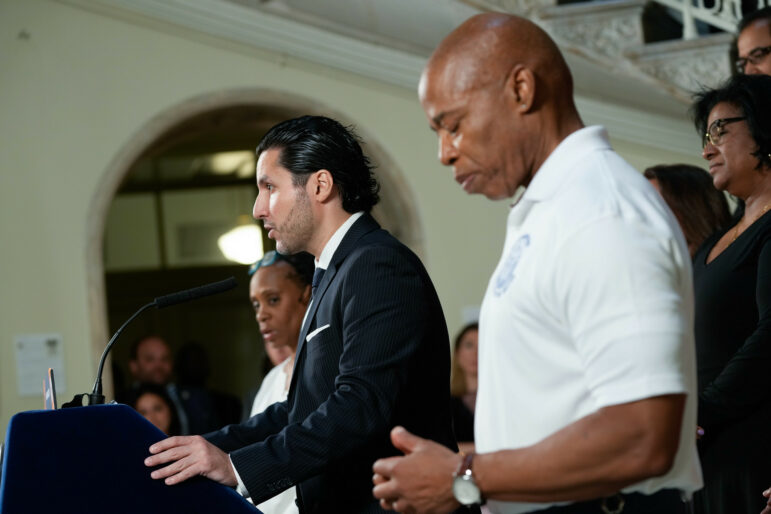The city is seeking permission to issue the time-limit notices to adult asylum seekers who are being housed in Department of Homeless Services facilities, saying that doing so will open up room for families with children, who currently make up the majority of asylum seekers in DHS’ care.

Michael Appleton/Mayoral Photography Office
Mayor Eric Adams and Deputy Mayor for Communications Fabien Levy at City Hall on Monday.New York City is seeking permission to extend a policy limiting shelter stays to a larger population of asylum seekers, including those staying in shelters run by the Department of Homeless Services (DHS), according to an Aug. 9 letter sent to state lawyers.
The letter, first reported by the New York Times, was sent privately to the state as part of ongoing negotiations regarding the city’s unique “right to shelter”—initially established in a 1981 court decree in the case Callahan v. Carey and ensuring that anyone who needs a shelter bed in the city can access one, at least temporarily.
Last month, the city began issuing 60-day notices to single adult asylum seekers in certain emergency shelters run by agencies other than DHS, saying recipients would have to reapply for a placement if they could not find alternative housing within that window. More than 2,900 notices have been issued so far.
Now, the city is seeking permission from the state Office of Temporary and Disability Assistance (OTDA) to issue notices to single adults and adult families in DHS facilities, saying that doing so will open up room for families with children, who currently make up the majority of asylum seekers in DHS’ care, and in the city as a whole.
“This would only apply to asylum seekers, not to longtime unhoused New Yorkers,” Fabien Levy, the city’s deputy mayor for communications, said at a press briefing Wednesday when asked about the expanded policy.
Asylum seekers who received the time limit would simultaneously get “more intensified casework” from the city, Levy added, to aid them in seeking out permanent housing options before the deadline hits.
OTDA deferred to Gov. Kathy Hochul’s office for comment. A spokesperson for the governor referred City Limits to the state’s own letter responding to the city’s list of requests in the Callahan case.
“The State stands ready to continue to address the City’s additional needs for regulatory flexibility and will promptly review requests to waive regulatory requirements,” attorneys for Hochul’s office wrote in their response, saying OTDA officials will meet with Mayor Eric Adams’ administration this week as part of that review.
“Within the City’s Department of Homeless Services (‘DHS’) system, the State has responsibilities to ensure that any waivers of regulatory requirements do not endanger the health and safety of migrants or others,” the letter continued.*
According to newly-released data from the New York City Council, there were 4,107 single adult asylum seekers and 1,782 asylum seekers in adult-only families staying in DHS shelters as of the end of July, for a total of 5,899 people.
So far, according to City Hall, 60-day notices have only been issued to single adults in the non-DHS pool, which included 7,510 people on July 30. Based on this data, adding adults in DHS shelters could expand the notice-eligibility pool by more than 78 percent.
Joshua Goldfein, an attorney with the Homeless Rights Project at the Legal Aid Society, said Wednesday that his team is closely monitoring the rollout of 60-day notices, the first of which were issued in late July. He stressed that the right to shelter should protect asylum seekers from being turned away if they have no alternative after 60 days.
“There have been a lot of language barriers and a lot of rhetoric along the way about what this process is, so we are very concerned that people not get bad information,” he said. “And that they understand that whatever happens at the end of the day, they’re still entitled to a shelter placement.”
City Councilmember Shahana Hanif, chair of the Council’s Immigration Committee, said Wednesday that City Hall did not preview the potential expansion of 60-day notices to adult asylum seekers in DHS shelters at a hearing on the policy last week.
“The directive as-is is inhumane,” Hanif said, predicting that it will lead to increased street homelessness. The hearing did not inspire confidence that adults will receive the help they need, she added, likening the 60-day notice to “essentially a vacate order.“
Deputy Speaker Diana Ayala, who chairs the General Welfare Committee, expressed concern as well.
“I understand that the mayor is grappling with a challenging crisis that demands significant city resources for effective management,” Ayala said in a statement. “The city has been diligently working to relocate asylum seekers to their preferred locations outside of New York City, aiming to alleviate the strain on our shelter system.”
Yet for those who remain, the administration does not have a good track record, she continued. “Envisioning a scenario where the administration efficiently provides services to asylum seekers within their self-imposed 60-day time constraint raises doubts.”*
The city’s request to OTDA comes as city and state officials continue to negotiate about how to meet the needs of tens of thousands of asylum seekers who have arrived in New York City since last April. A conference in state court is scheduled for next Wednesday.
A new 1,000-bed emergency shelter for single adults opened at the Creedmoor Psychiatric Center in Queens this week, and another large-scale site is planned for Randall’s Island.
Of the approximately 101,000 asylum seekers who’ve come to the city so far, more than 43,000 have since left the shelter system, Levy said Wednesday.
“Some of those because of intensified casework, some because they just found their own place. So lots of people are moving on on their own,” he said.
*This story was updated after initial publication to include comment from the governor’s office and Deputy Speaker Ayala.
To reach the reporter behind this story, contact Emma@citylimits.org. To reach the editor, email Jeanmarie@citylimits.org.








